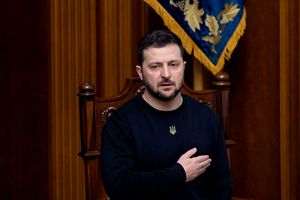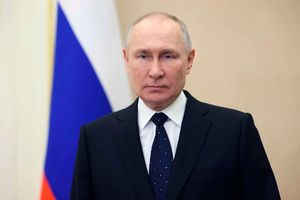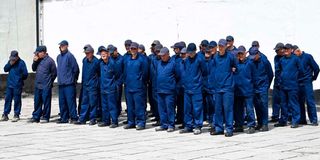
Prisoners of war stand in formation inside a Ukrainian detention facility where foreign fighters are held under strict supervision as part of wartime operations linked to the ongoing Russia-Ukraine conflict.
Behind barbed wire and thick concrete walls of a Ukrainian prisoners of war (POW) camp – far from their countries and dreams – eight African men sit in reflection.
They are neither Ukrainian nor Russian but from Togo, Ghana, Somalia, Sierra Leone, Egypt and Tunisia. The Saturday Nation did not encounter an Kenyan in the detention camp.
Lured by promises of work, education and better employment opportunities in Russia, these men now find themselves detained for fighting in a war they never imagined to be part of.
As the war escalated after the invasion by Russia of its neighbour on February 24, 2022, they were swept into a distant conflict that has little to do with their countries, and everything to do with where they happened to be when the bullets, missiles and drones began flying.
To fight for Russia under contract, one must undergo three months of training before being deployed to the battlefields in Ukraine.
For Mohamed Hussein, 29, going abroad was his only way out of the hardships and hunger his family had endured at home in Somalia. He hoped things would be different if he were away from Somalia and Africa in general.
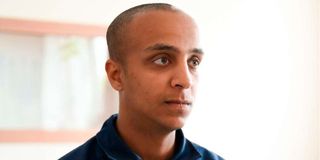
Mohamed Hussein, a native of Somali now imprisoned in Ukraine, after he was captured. He awaits an exchange.
Hussein told the Saturday Nation that in his search for a better future, he looked to Europe. He applied for visas to the Schengen region – the European Union – tried every possible European embassy and knocked on every digital and physical door he could find, expecting to be granted an opportunity to escape the grinding poverty back home.
Unfortunately, every application was either rejected or ignored.
“I tried all of Europe. I wanted to offer my family a better life. The most unfortunate thing about the whole thing is the weakness of the Somali passport,” he said.
“The Schengen area, Germany, France and even small European countries never gave me a chance. They look at the Somali passport and cast it away. It is like that passport is a curse. It tells the world you are nothing. But when I tried Russia, I was accepted.”
When Moscow opened its doors – through what appeared like a loophole in the visa system – Hussein jumped at the opportunity.
Informed of jobs in Russia
The visa was approved in just a week, something that shocked him, considering how long European systems took to even reply. There was no looking back.
“My visa application was accepted so quickly that I thought there was a mistake. But it was real. I saw it was my only path to economic freedom,” Hussein added.
“When your country gives you nothing, and the world shuts the doors in your face, you walk through any window that opens – even if it is burning on the other side.”
Hussein added that he was informed of jobs in Russia by friends. They told him that he could make enough money to change his life forever in just a year.
He followed them, not fully understanding the details of the contract he was signing. All he knew was the $2,000 every month and $2 million once he signed.
The numbers appeared unbelievable but he took the chance.
“They showed me the contract and the account. It was real. Right now, the money is there in my name,” Hussein said.
“I may look like I have nothing, not even cigarettes or shoes, but I am not a pauper. I took a risk as there was no other choice. I am just waiting to be exchanged with Ukrainian prisoners of war and I will be in Russia.”
The job he signed for, Hussein later learnt, would take him near the frontline in Ukraine.
It was not the kind of job he envisaged when he left Somalia but it was too late to turn back by then.
Hussein then convinced himself that the war was better than the slow death of poverty.
“I am not a fighter but I am a father. I want to have a family. I want my children to eat, go to school and live without fear. That is why I will remain in Russia. I will bring my family here. Even if the prices of basics are high in Russia, I can still improve my lot,” he said.

Prisoners of war stand in formation inside a Ukrainian detention facility where foreign fighters are held under strict supervision as part of wartime operations linked to the ongoing Russia-Ukraine conflict.
For Hussein, the decision to go to war was not about politics or alliances. It was about survival. He grew up witnessing his country disintegrate, opportunity after opportunity slipping away. The little he had was always under threat. He says most of the world does not understand what desperation can do to a man.
“People judge us. They say, ‘Why would you sign a war contract? Why would you go to Ukraine?’ But you tell me — who will feed me? Who will open my mouth and put food there? I do it myself. I choose danger over despair because I want to live. I didn’t come to fight. I came to live,” he says.
There is a mix of order and quiet labour at the camp. The beds are neatly arranged in rows, with identical grey blankets folded with military precision.
There is a canteen, where simple lunches are prepared and served on schedule – often soup, bread and basic protein. Just beyond the sleeping quarters, prisoners move to a large workshop that appears like a warehouse.
Here, they spend hours making wooden chairs, colourful swings, decorative Christmas trees and other items. The sounds of hammers and drills echo through the space, a reminder that for many that work has become routine. There is also a designated area prisoners lift weights, run and do other exercises to maintain their strength. And they do so under watchful eyes.
“We treat them fairly. I bet the Russians don’t treat Ukrainian POWs this way,” a camp guard told the Saturday Nation.
To speak to us, Richard Mensah gave a condition.
“You will call my wife first. Promise that you will tell her I’m alive,” he said.
The 37-year-old Ghanaian, a father of two, sat on a bench in the camp, hands folded in his lap. He looked worn – far older than his years – the face heavy with regret.
Like Hussein, Mensah never imagined he would day find himself in such a place: detained, disoriented and caught in war thousands of kilometres away from home.
“I didn’t come to fight. I didn’t even know there was a war when I left Ghana. I was captured by Ukrainians on the first day. I was on the frontline,” he said.
Back home, Mensah had started looking beyond the borders for a better life. He asked friends who had travelled abroad, joined online forums and visited travel agents.
Then someone mentioned Russia. He applied for a visa, not expecting a response. Two weeks later, it came.
Pursuit of education
“I couldn’t believe it. There was no stress. I thought it was my chance,” he said.
Mensah flew to Moscow in early 2024. The city overwhelmed him. It was huge, unfamiliar and ice-cold. Still, Mensah remained hopeful. But reality set in sooner than he expected.
Language barrier made it difficult to ask for help. Mensah had no Russian contacts and his money was running out.
“I thought I’d find someone welding or factory work in the first week. I wasn’t there to be picky,” he said.
Then Mensah met a Nigerian who became his “agent”.
“He said I’d get paid in dollars and I just needed to sign a contract. I asked what the job it was, and he talked of logistics and support. It sounded great,” he said.
The contract was in Russian. Mensah was taken to a remote location and military gear issued days later.
“I couldn’t read the contract. I told the Nigerian man that I didn’t understand it. He just laughed and talked of formalities, adding that I would thank him later. I was tired and hungry so I signed. We were trained for three months, then sent to war,” he said.
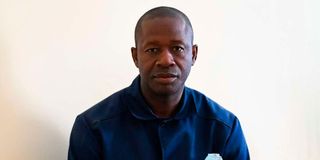
Richard Kanu, 37, a native of Sierra Leone now imprisoned in Ukraine.
Ahmed El-Sayed, 23, never imagined his pursuit of education would lead him to the frontlines of a distant bloody war.
The 23-year-old from Alexandria, Egypt, arrived in Russia on a student visa, eager to study ICT.
However, things quickly took a turn for the worse. Struggling with language and rising expenses, Sayed was arrested after being found with a small amount of drugs. He was given a seven-year prison sentence.
“I was so proud when I got that scholarship that I told my mother that it would change our family from then on. Desperation led to the mistake I made. I couldn’t settle rent and did not know who to ask for help. I felt crushed – no school and no future, just a cold cell,” he said.
Then came the offer: sign a contract and go to war – or remain in prison. Sayed didn’t sign the contract in a court of law. It was in a cold Russian prison cell.
Trembling, he said, he clutched a pen facing impossible choices – spend seven years behind bars for a drug offence in a distant land or sign a contract that would send him to the frontlines.
“They said that if I went to the front, I would be free in six months. There was no time for thinking. I just signed the paper. In fact, I didn’t even know who I was going to fight. I kept thinking; I came here to study. How did I end up here? And remember I am 23,” he said.
Captured by Ukrainian forces shortly after deployment, Sayed now waits in a prisoner of war camp – haunted by the choice no one should have to make.
“The only thing to do is sit and wait for an exchange. Perhaps the Egyptian embassy can be of help,” he said.
Maksym Subkh, the Special Representative of Ukraine for the Middle East, told journalists visiting Ukraine that people from different African countries were among foreign prisoners POWs, raising questions on how and why the individuals ended up fighting in Europe.
Subkh said Ukrainian military intelligence and the armed forces headquarters formally notify embassies after capturing individuals with foreign passports – specifically Africans.
Countries of origin are informed through their embassies, triggering diplomatic channels for potential negotiations.
“We were informed by the armed forces headquarters and the president’s military intelligence service that some holders of foreign passports had been captured,” Subkh said.
“The passports included African. We informed their countries.”
Subk said Ukrainian authorities believe some of the men captured arrived in Russia as migrant workers or students but ended up being caught up in the conflict in circumstances that remain unclear.
According to the official, diplomatic efforts are on to secure their release through formal legal procedures involving the United States, which has been working closely with Ukraine on POW matters.
“We started negotiations with the other side, based on the legal framework Ukraine has with the US. There are times some additional memoranda are required to be signed in order to hand over the captives to their countries,” he said.

